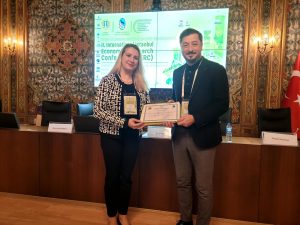The EU Green Deal starts from the fact that climate change and environmental degradation are an existential threat facing Europe and the world. To meet these challenges, Europe needs a growth strategy: one that transforms the Union into a modern, resource-efficient and competitive economy with no net greenhouse gas emissions. By 2050, the goal is to decouple economic growth from resource use and ensure that no person or place is left behind.
The Compact is a new growth strategy that aims to transform the European Union into a competitive economy where economic growth is decoupled from resource use. It offers a series of action plans aimed at accelerating the transition to a clean, circular economy by increasing the efficient use of resources, restoring biodiversity and reducing pollution. It also describes the necessary investments and available financing instruments and explains how to ensure a just and inclusive transition.
The Strategy’s main objectives are:
– To support companies in driving the transition using clean products and technologies.
– Reduce pollution to protect human life, animals and plants.
– Become climate neutral by 2050.
– Protect EU citizens from environmental risks and impacts.
To effectively implement the EU Green Deal, the EU needs to design and ensure a fair transition system for all regions and sectors.
According to estimates, €260 billion per year will be needed to achieve the EU Green Deal’s climate and energy targets by 2030. To achieve these targets, the EU Green Deal includes 50 actions to be implemented between 2019 and 2021. These actions will take the form of regulations or directives on climate, energy, circular economy, transport, agriculture, financial services, biodiversity and waste management. Steps will also be taken to update existing applicable legislation.
Green Deal and Turkey
The Action Plan aims to implement 81 actions identified in line with the EU’s policy priorities. These actions are (1) carbon regulations at the border, (2) green and circular economy, (3) green finance, (4) clean, affordable and secure energy supply, (5) sustainable agriculture, (6) sustainable smart transportation, (7) combating climate change, (8) diplomacy and (9) information and awareness raising activities. A Working Group under the coordination of the Ministry of Trade continues to work to achieve these goals and to ensure that the actions are aligned with current developments.
Presidential Circular No. 2021/15 stipulates that specialized working groups may be established to assist the Working Group. In this framework, the Working Group will work on the EU Border Carbon Regulation Mechanism, National Carbon Pricing, National Circular Economy Action Plan, Steel, Aluminum, Cement, Textile and Apparel, Construction Sectors, Green Financing, Financing of EU Projects, Clean Energy, Sustainable Agriculture, Sustainable Smart Mobility, 20 Specialized Working Groups were established on Technological Transformation/Development, Sustainable Consumption and Production Action Plan, Sustainable Final Consumption, Zero Pollution Action, Just Transition Policies and Green Transformation in Education and Training and Harmonization of Technical Legislation on Sustainable Products.
Among these Specialized Working Groups, the coordination of the EU Border Carbon Regulation Mechanism, Sustainable Final Consumption, Textile and Apparel Sector, Construction Sector and Harmonization of Technical Legislation on Sustainable Products Working Groups has been undertaken by the Ministry. Other Working Groups are coordinated by the relevant institutions. The work carried out by these institutions is reported by the Ministry, which acts as the secretariat of the Working Groups
The impacts of the EU Green Deal will cover almost all main sectors of the Turkish economy. Significant changes are expected in sectors such as energy and services, consumer industrial goods and retail, construction, transportation, financial services and tourism.
In the energy and services sector, energy companies and service providers face major challenges to achieve their net zero targets. The shift in energy production foresees a greater use of renewable energy sources in most scenarios. The decarbonization strategy set out in the EU Green Deal is included in the National Plan for Energy and Climate of the Hellenic Republic. Reducing coal use and transitioning to net zero will have significant socio-economic impacts, especially in regions with coal mining and lignite power plants. For these regions, the EU Fair Transition Mechanism will ensure an orderly transition and long-term sustainable development through National Plans and other financial support.
The EU Green Deal is expected to have an impact on almost all main sectors of the Turkish economy. Indicators include the following areas:
– Energy and services
– Consumer industrial goods and retail
– Construction
– Transportation
– Financial services
– Tourism
Energy and Services at the Forefront
– Energy and utility companies face major challenges due to decarbonization, which is currently crystallizing around net zero targets.
– The transition in the energy generation mix is important, with most scenarios foreseeing continued growth in renewables.
– The decarbonization strategy (closure of lignite power plants) is part of the EU Green Deal action plan and is included in the Hellenic Republic’s national plan for energy and climate.
– The transition to net zero and coal phase-out has significant socio-economic impacts for local communities, where lignite units or coal mines are operating. The regions concerned will be supported through the EU Just Transition Mechanism, National Plans and other funding sources to ensure a smooth transition and long-term sustainable development.
It is critical for companies to adapt to the new processes in order to maintain the market share of the country’s exports and to ensure that exporters do not have problems with sales and avoid loss of market share in the long term. In this context, international environmental policies such as the EU Green Deal need to be taken into account.
The EU Green Deal includes a comprehensive action plan on environmental sustainability and targets such as reducing carbon emissions. Exporters should take into account that such policy changes may lead to increased pressure on the environmental impact and sustainability standards of their products, especially when exporting to the EU market.
Therefore, exporters should comply with the requirements of the EU Green Deal by investing in green production methods and sustainable supply chain practices. Moreover, developing and marketing products and services to reduce environmental impact can enhance exporters’ competitiveness and help them to maintain their presence in the EU market.
Exporters can adapt to the changes brought about by the EU Green Deal by both contributing to environmental sustainability and maintaining their competitive advantage in the international market. This can improve both the long-term success of companies and the competitiveness of the country’s exports.
It is important to recognize that the field of accounting plays a critical role regarding the effective implementation of the Green Deal, environmental sustainability and goals such as reducing carbon emissions. Therefore, companies need to update their accounting systems and build the necessary infrastructure to account for environmental impacts in order to achieve these goals.
It remains essential to remember that accounting is a powerful tool for assessing the impact of investments and activities undertaken under the Green Deal. Tools such as environmental accounting and cost accounting can help companies to accurately calculate the costs and benefits of green projects. This enables companies to make more informed investment decisions on green projects.
In addition, transparent and accountable financial reports make it easier to monitor Green Deal targets and assess companies’ environmental performance. These reports show investors, stakeholders and the general public companies’ environmental commitments and sustainability performance, while also informing internal stakeholders.
The proper use of accounting guides companies in achieving the goals of the Green Deal, while at the same time helping companies establish credibility in sustainability reporting. This is critical for companies to comply with the Green Deal and achieve their environmental sustainability goals.
At IQ Audit, we understand the importance of the Green Deal and provide a roadmap to help companies achieve these goals. We prepare special reports for companies to calculate the environmental impacts and monitor the Green Deal targets, including the sustainability legislation published by the POA and international standards.






